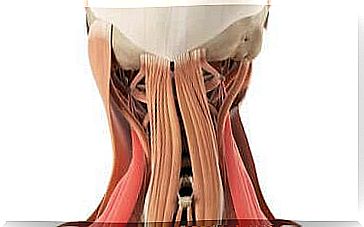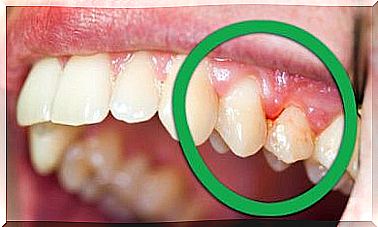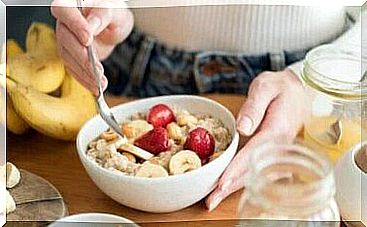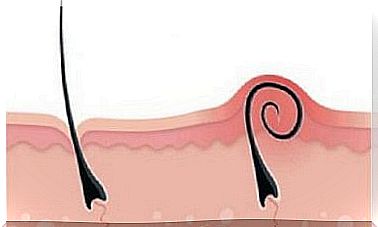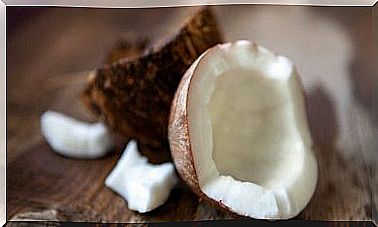6 Diets For Irritable Bowel Syndrome Control
Diet modification is essential for controlling the symptoms of Irritable Bowel Syndrome, one of the most common illnesses today.

Do you suffer from irritable bowel syndrome? You will therefore need to change your eating habits to control your symptoms. In this article, we will introduce you to 6 types of diets for irritable bowel syndrome.
Irritable Bowel Syndrome is a predominant condition in women under 45, although there are, of course, men and people over 45 who have it. This problem, which affects the large intestine, can cause intestinal cramps, gas, bloating, constipation and diarrhea.
Although, as we said before, it is a common condition today, the exact causes are not yet known . If you think you have an irritable bowel, contact your doctor for an evaluation.
Diets for irritable bowel syndrome
Symptoms can be very unpleasant, so specialists often suggest diet changes to control them. However, there is no consensus on the best diet to control symptoms. As a general rule, it is often suggested to:
- Do not eliminate foods from the diet, unless medically indicated
- Avoid carbonated drinks
- Limit the consumption of fatty foods
- Increase fiber intake
- Don’t eat too much
- Drink between two and three liters of water per day
- Avoid eating legumes, crucifers, and other foods that produce gas
- Eliminate tobacco and alcohol from the diet
It should be noted that the diet intended to control irritable bowel symptoms should be personalized. Consult a professional before making any changes to your diet.
-
Low FODMAP diet for irritable bowel syndrome
Among the diets for irritable bowel syndrome we find the low FODMAP diet. That is to say a diet based on minimizing the consumption of short-chain carbohydrates : fermentable oligosaccharides, disaccharides, monosaccharides and polyols.
How would you help reduce the intake of these foods to control irritable bowel symptoms?
It’s very simple: Many people do not absorb these components in their small intestine, so they continue to the colon where they feed the bacteria and where the symptoms are generated.
Some research suggests that avoiding the carbohydrates mentioned above reduces the inconvenience by preventing bacteria from fermenting foods. However, there are no conclusive studies on this topic.
At the beginning of this year, the Spanish Society of Digestive Pathology announced that after a first phase of severe restriction of FODMAP for 4 to 8 weeks, it is advisable to gradually reintroduce food to check tolerance and develop a diet the least restrictive possible.
2. Lactose free diet
If the doctor suspects lactose intolerance, partial exclusion of dairy products can be done for one to two months, then food can be reintroduced and the patient’s reactions observed.
In many cases, irritable bowel syndrome is associated with problems with the metabolism of dairy products, so this option can improve the patient’s condition.
3. Gluten-free diet

According to various research, it is estimated that 30% of celiacs were previously classified as having irritable bowel syndrome.
This is why, in the event of a suspected sensitivity or allergy to gluten, the doctor may decide to exclude foods containing gluten in order to verify if this is the trigger for the discomfort.
4. Diet against constipation
If you suffer from irritable bowel with chronic constipation, some specialists may recommend that you include foods high in insoluble fiber in your diet, which speeds up bowel movements. It is present in vegetables and whole grains.
When your problem is alternating episodes of constipation and diarrhea, you should incorporate a regular intake of soluble fiber, found in foods such as oats and barley, seeds and fruits, into your eating habits.
5. Diet for diarrhea

Diets for irritable bowel syndrome include an option to control diarrhea. It is a very common symptom in some cases of irritable bowel.
It also requires great attention due to possible problems of malabsorption of essential nutrients.
If you regularly suffer from diarrhea, you should avoid coffee and alcohol, as both are bowel stimulants. The same goes for dairy products. However, it is important that you include other sources of calcium in your diet, such as soy milk.
6. Recommendations from healthcare institutions against irritable bowel syndrome
It is impossible to come up with a list of recommended foods for all people with irritable bowel disease because, as we said at the start of the article, the diet needs to be personalized based on the symptoms and response to it. diet of each patient.
However, below we present a selection of foods whose consumption may be considered recommended, restricted or prohibited by the Endrocrinology and Nutrition Department of the University Clinical Hospital of Valladolid (Castilla y Leon, Spain).
Recommended foods:
- Wholemeal bread, wheat bran and whole grains
- Whole egg
- Fruits and vegetables
- Skimmed milk
- Lean meats
- Dried fruits
- White fish
- Olive oil in moderate quantity
- Water
- Infusions
Foods subject to restrictions
- The blue fish
- The cold cuts
- Legumes
Prohibited foods
- Flatulent vegetables, such as cauliflower or broccoli
- Full fat and whole milk cheeses
- Red meat and cold cuts
- Sliced bread
- Butter and margarine
- Hot spices
- Commercial sauces
- Coffee
- Alcohol
- Soft drink
Before changing your diet, consult your doctor. An irritable bowel syndrome specialist will be able to design your diet based on your symptoms and personal needs.


